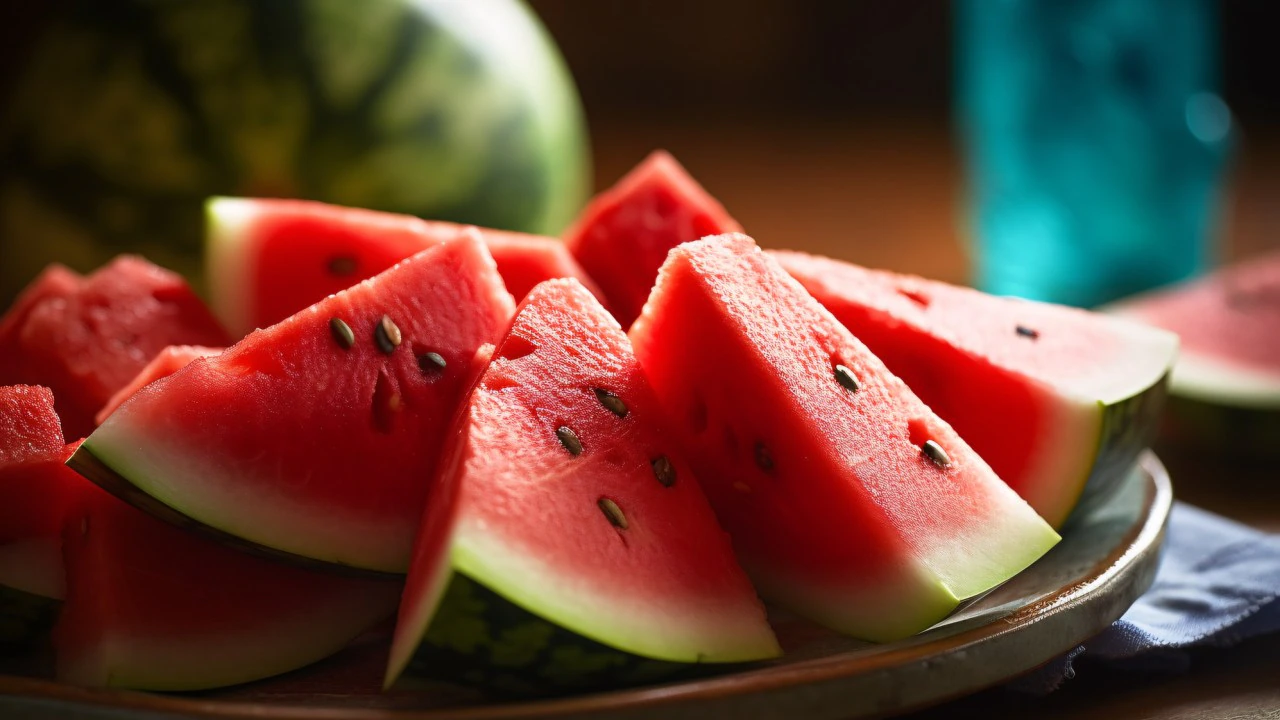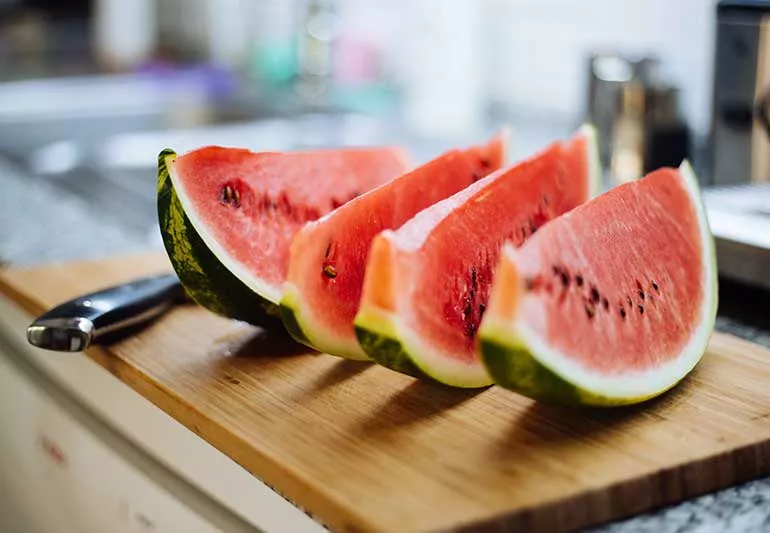Watermelon is known to keep the body hydrated, regulate blood pressure, control arthritis, prevent cancer and improve digestion. However, consuming too much watermelon can cause bloating, diarrhea, nausea and irregular heartbeat.

10 Health Benefits of Watermelon & Notes When Using It
Watermelon – Origin and Characteristics

Watermelon is a climbing plant, belonging to the Cucurbitaceae family, originating from West Africa.
Watermelon has a thin, herbaceous stem that grows on its own but produces large fruit, an average watermelon can weigh from 1.5 to 4 kg. Watermelon has a green skin, red or yellow flesh, contains a lot of water and has a sweet and cool taste. Currently, watermelon is one of the most popular and widely used fruits in the world.
How many calories are in watermelon?
On average, each piece of watermelon (about 154g) provides only about 46 calories. With a low calorie content, watermelon is often added to the diet to control weight and maintain an ideal figure.
Although providing low calories, a piece of watermelon can supplement the body with many essential vitamins and minerals such as:
Vitamin B
Magnesium
Potassium
vitamin A
Vitamin C
Water (more than 92% of watermelon is water)
Carotenoid
Lycopene
Beta-carotene
Citrulline
10 Health and Beauty Benefits of Watermelon
 What are the benefits of eating watermelon?
What are the benefits of eating watermelon?
1. Supplementing watermelon helps to retain
water for the body Water is the component that accounts for 92% of watermelon.
Therefore, supplementing this fruit has the effect of retaining water for the body and maintaining electrolyte levels. Eating watermelon regularly can reduce symptoms of dehydration after strenuous exercise and sports such as cramps, fatigue, dizziness, etc.
In addition, with its abundant water content, watermelon also creates a feeling of fullness for a long time and prevents overeating. This can help you reduce the amount of food in each meal and limit uncontrolled weight gain.
2. Antioxidant and body protection
Watermelon is a fruit that contains a variety of antioxidants. These ingredients have the ability to prevent the effects of free radicals, slow down the degeneration process and protect organs in the body.
Some antioxidants found in watermelon include:
Vitamin C: Has the effect of enhancing immunity and preventing cell damage caused by free radicals.
Lycopene: Is a type of carotene found in many other foods such as tomatoes, papaya, sweet potatoes, etc. Lycopene helps protect retinal and nerve cells from the effects of free radicals.
Carotenoids: Are plant compounds including beta-carotene and alpha-carotene. These components, after being absorbed into the body, will be converted into vitamin A.
Cucurbitacin E: This compound not only has antioxidant effects but also has the effect of controlling inflammatory responses in the body.
3. Supplementing watermelon helps prevent cancer
Lycopene in watermelon not only has antioxidant effects but can also prevent cancer – especially gastrointestinal cancer.
This compound reduces the risk of developing cancer cells by reducing the growth factor IGF. In which, increased IGF is one of the causes of stimulating abnormal cell growth and the risk of transforming into cancer cells.
In addition, watermelon also contains Cucurbitacin E – a plant compound that inhibits tumor growth and prevents the metastasis of cancer cells.
4. Preventing cardiovascular diseases
In addition to cancer prevention, watermelon also has the ability to reduce the risk of cardiovascular disease – one of the leading causes of death.
High cholesterol is a factor that increases the risk of cardiovascular diseases such as atherosclerosis, high blood pressure, myocardial ischemia, heart failure, etc. Supplementing foods rich in fiber, water, vitamins and antioxidants can reduce the amount of cholesterol accumulated in the body and prevent cardiovascular problems.
Regular consumption of watermelon can prevent cardiovascular diseases such as high blood pressure, heart failure, etc.
In addition, many experts believe that Lycopene in watermelon can reduce the thickness and stiffness of the arterial wall. Thereby helping to reduce the risk of arteriosclerosis and blood clots.
Moreover, citrulline in watermelon can also stimulate increased nitric oxide levels in the body. Nitric oxide is a component that helps dilate blood vessels and regulate blood pressure.
With high fiber and water content, watermelon has the ability to increase the peristalsis of the digestive system.
3 Best Ways to Use Watermelon

You can supplement watermelon by eating it directly, processing it into watermelon smoothie, watermelon jam, etc.
Remove watermelon seeds, then mash Drain excess water and mix well with unsweetened yogurt Apply the mixture to the skin and rinse after 20 minutes
Taboos and Notes when eating watermelon
Eating too much watermelon can cause bloating, flatulence, nausea, indigestion, excessive hypotension, etc.
Watermelon contains abundant nutrients and has many good effects on health. However, you should only add watermelon 2-3 times/week to avoid risks and unwanted effects. In addition, you should combine it with other foods to diversify the nutritional composition and have a comprehensive impact on health.






